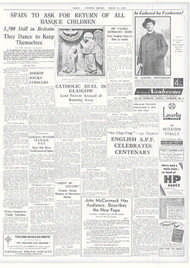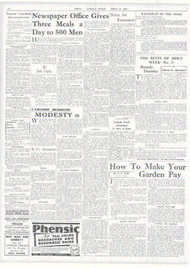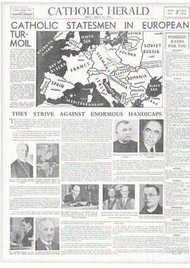Page 6, 24th March 1939
Page 6

Report an error
Noticed an error on this page?If you've noticed an error in this article please click here to report it.
Tags
Share
Related articles
The Maltese Clergy Loyal To Britain
English Visitors' Impressions Of Malta
Wisdom Of The Curia
Catholic Action In Malta President's Protest
Malta Last Bastion Of Catholicism?
PRIESTS AND THE LANGUAGE OF MALTA
SIR,—Fr. Bugeja's letter in the CATHOLIC HERALD of the 17th inst. attributed to me some statements which I did not make. He asks me if I am not " exacting too much of the Maltese clergy when I invite them to throw overboard their centuries-old Latin culture in order to establish new cultural contact with England." I suggested nothing of the kind; as a matter of fact I do not see why our priests should " throw overboard" their Latin culture, which is a culture common to all Catholic communities everywhere.
As to the Italian language, our contention is that it should continue to be, with English, one of our cultural languages but not the official language of Malta, for that may give It a political importance that is easily exploited by the propaganda of the foreigner. The national language of Malta now is Maltese, the language spoken by all the inhabitants of the islands. But I must repeat my statement so inaccurately reported: " There is no reason why it should not be made possible for our Maltese priests to establish closer cultural contact and co-operation with the Catholics in England." Nor did I say that the Maltese priests are opposed to the teaching of English and British history. What I said exactly was that " our clergy are not properly trained in the English language and history," the cause being not hostility but the inefficient organisation of our educational life.
That the Church Missionary Society was the first to obtain permission for a printing press does not mean that the Maltese clergy of the time could not have had the imagination and the foresight to ask for a similar permission before and give Malta the first Catholic Anyhow, the next very good translation of the New Testament was made by Mr G. Muscat-Azzoppardi, a master of the Maltese language and, like most Maltese authors, a writer with a very Catholic mind. The reason is that our priests have always despised the language in which they preach as a patois, which also explains why we have only one or two sacred orators whose published Maltese sermons it is a pleasure to read; on the other hand, many scribblers with a deficient education, who always step in where those who ought to know better step out, have given us an infinite production of pious doggerel. Fr. Bugeja refers to Maltese, his and my native tongue, as the " socalled language." He may not know that much has been done for its development recently. If be is interested he might like to read my article on the subject in the Poetry Review of January-February, '39, and if he is interested in Maltese grammars, the Oxford Press has published two very good ones: one by the Rev. E. Sutcliffe, S.J., and another by Miss M. Butcher.
I think that it is better for us Maltese not to be so satisfied with things as they are, and I also hope that this outspoken but well-meant criticism from one who considers the Catholic Faith and the Roman culture of Latin Christendom the very strength of Malta in spite of our many shortcomings. will not he misunderstood, especially by my countrymen.
PROFESSOR J. Acitufasa.
blog comments powered by Disqus

















